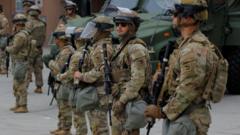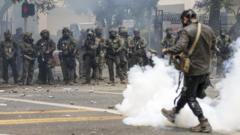As protests against ICE efforts unfolded in Los Angeles, Donald Trump's quick response included federalizing the National Guard. While his supporters hail this move as a strong stance on law and order, critics warn it could escalate tensions and lead to further unrest.
Trump's Emergency Response to LA Protests Sparks Controversy

Trump's Emergency Response to LA Protests Sparks Controversy
The President’s swift action amidst California protests has ignited both support and outrage among political circles.
In an atmosphere charged with political tension, Donald Trump’s recent actions in Los Angeles during protests against Immigration and Customs Enforcement (ICE) efforts have reignited debates on law enforcement and civil rights. Drawing from his campaign promises to combat left-wing unrest, Trump seized the opportunity to assert federal authority despite the Los Angeles Police Department (LAPD) deeming the majority of protests as peaceful.
Homeland Security Secretary Kirsty Noem cited instances of injury among immigration agents and perceived delays in local law enforcement response as justification for quick federal intervention. Following a controversial decision to federalize 2,000 California National Guard troops, Defense Secretary Pete Hegseth indicated US Marines were also on standby—marking a rare instance of active military readiness on American soil.
Despite Trump’s declaration of victory over unrest by Sunday morning, critics quickly challenged the president's tactics. Democrats expressed concerns that the aggressive deployment of military-style immigration officers was inflammatory and counterproductive to maintaining peace. New Jersey Senator Cory Booker emphasized that Trump’s tactics could exacerbate unrest, claiming the President's actions were inciting chaos rather than curbing it.
Noem responded to criticisms by referencing the handling of 2020 protests, suggesting that ample governmental action was necessary to prevent a similar scenario. Meanwhile, commentators stressed the potential implications of the recent protests, questioning whether they represent an isolated incident or a prelude to broader civil disruptions in the wake of Trump's second term. As summer proceeds, the evolving dynamics in California’s streets may serve as a critical barometer for national sentiment over immigration enforcement and police relations.



















